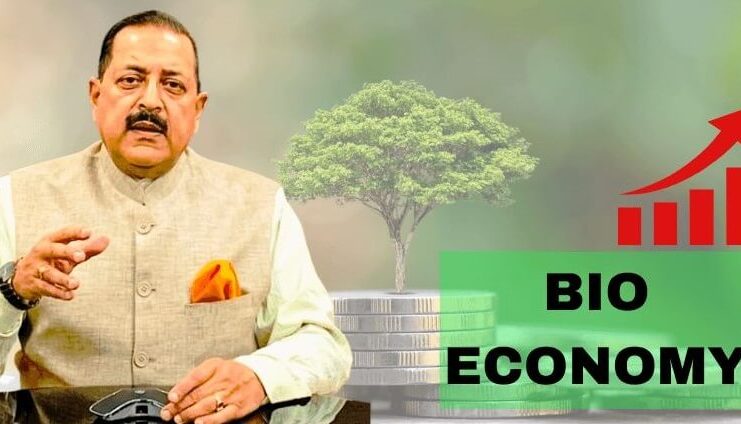India is making strides towards achieving a significant goal, establishing a bio-economy valued at $150 billion by 2025, a substantial increase from the $100 billion recorded in 2022. Jitendra Singh, Union Minister of Science and Technology, highlighted India’s growing prominence in the field of biotechnology. He emphasized that India ranks 12th globally and third in the Asia-Pacific region in biotech. Despite comprising only 3-5% of the global biotech market, India’s influence is expanding due to its vibrant startup scene and its position as a major vaccine producer.
Singh’s comments were made in the context of overseeing an agreement between India’s Department of Biotechnology and the United States-National Science Foundation. He pointed out India’s rising achievements in science and technology, with a noteworthy 40th position on the global innovation index. Singh credited initiatives like – “Make-in-India” and “Atma Nirbhar Bharat” for fostering a strong foundation in biotech research, innovation, and manufacturing across various sectors.
Addressing global challenges such as climate change and resource management, Singh stressed the importance of forward-looking research and innovation. He also highlighted the Department of Biotechnology’s efforts towards “Fostering High Performance Biomanufacturing,” aligning with the prime minister’s ‘Lifestyle for the Environment (LIFE)’ initiative, which seeks eco-friendly solutions to meet climate goals.
Singh underscored that the recent agreement between the Department of Biotechnology and the United States-National Science Foundation will enhance collaboration in biotechnology innovation and bio manufacturing, benefiting both nations’ biotech sectors and bio-economies.
India’s Bio Economy: A $150 Billion Opportunity
India is positioned to emerge as a global leader in the swiftly expanding field of the bioeconomy—a sector encompassing the productive utilization of biological resources for economic gain. The nation possesses several inherent advantages in this domain, including a burgeoning population, abundant biodiversity, and a robust scientific and technological foundation.
The Indian government has proactively taken measures to propel the bioeconomy forward. This includes the establishment of the National Bioeconomy Mission in 2021, with the ambitious goal of achieving a substantial $150 billion bioeconomy by the year 2025.
The realization of this ambitious objective would signify a momentous achievement for India. Such a feat holds the potential to catalyze job creation, stimulate economic expansion, and substantially enhance the overall quality of life for a multitude of individuals.
The concept of a bio-economy :
Bio-economy involves utilizing renewable biological resources such as crops, forests, marine resources, and microorganisms to produce a range of goods, including food, energy, pharmaceuticals, and materials. Jitendra Singh’s vision underscores the importance of leveraging India’s rich biodiversity, advanced biotechnology capabilities, and sustainable practices to propel economic development while also ensuring environmental preservation.
This objective represents a significant advancement in the economic contributions stemming from industries reliant on biological resources, encompassing sectors like agriculture, healthcare, energy, and manufacturing. To realize this aim, it would entail strategic investments in research and development, infrastructure, policy reinforcement, and collaborations between public and private entities. The anticipated growth of the bio-economy not only denotes financial gains but also underscores progress in scientific knowledge, job creation, and societal well-being.
Jitendra Singh’s announcement showcases a proactive approach in aligning India’s economic trajectory with the principles of sustainability and innovation. As the target deadline approaches, achieving the $150 billion bio-economy milestone will undoubtedly demand coordinated efforts from stakeholders across government, industry, academia, and civil society. Successfully accomplishing this endeavor would establish India as a prominent global frontrunner in harnessing the potential of biological resources for both economic prosperity and societal progress.
The bioeconomy is a rapidly growing sector with huge potential for India. With the right policies and investments, India can become a global leader in the bioeconomy and create a better future for its people.
Read More – The Indian Economy : All Information Growth Rate & Statistics







